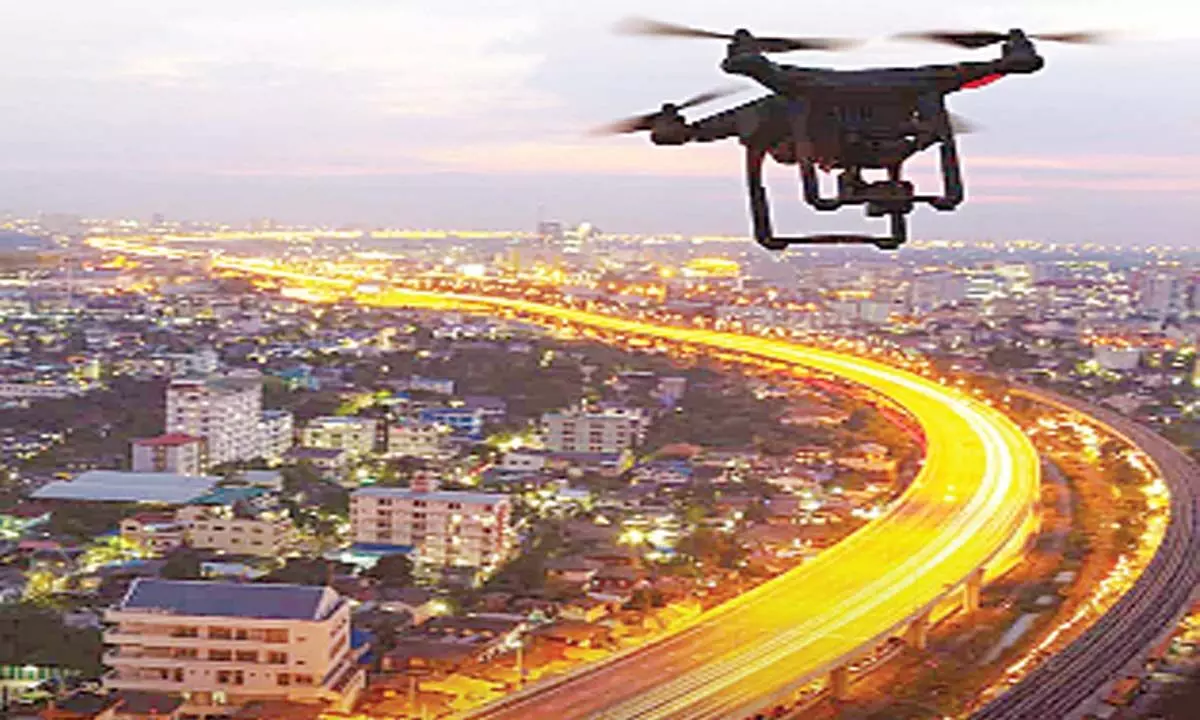Here's why PM Modi pushing for adoption of drone tech
Even though the sector is still nascent, drone technology will enable good governance and ease of living in the long run
image for illustrative purpose

The best part of drone technology is some of the jobs, like drone pilots and maintenance, would not require a formal degree. This will be a great liberation for rural youth as they would be able to fill up jobs as drone pilots, technicians etc
Promoting drone technology as 'another medium' that can help in achieving 'good governance and ease of living' across multiple sectors with varied applications, Prime Minister Narendra Modi asked the Indian youth to develop many more startups in the drone sector.
India's biggest drone festival Bharat Drone Mahotsav 2022, was inaugurated by PM Modi at the Pragati Maidan in Delhi. Addressing a gathering, he said: "At a time when we are celebrating Azadi Ka Amrit Mahotsav, it is my dream that everyone in India should have a smartphone in his or her hand, every farm should have a drone, and every house should have prosperity."
So, why is PM Modi pushing for the adoption of drone technology?
We know what information technology in the 90s did to urban India and the recent 4G data revolution to rural India. Although these two sectors didn't offer any immediate commercial benefits to individuals or groups, nonetheless, they revolutionised Indian society.
On the contrary, drone sector from the start has the potential to offer immediate benefits, be it commercial, safety, medical and many more. Thus, this sector has the tremendous potential to create, if not bigger, at least equal impact across rural and urban India.
To a large extent, drone technology is already in use in six leading sectors: agriculture, security (both internal and external along the border), medical, logistics, survey and entrainment. However, their role and application will become sophisticated with technological advancements and support from local manufacturers. Thus, Prime Minister Modi remarked, "the promotion of drone technology is another medium of advancing our commitment to good governance and ease of living. In the form of drones, we have a smart tool that is going to be part and parcel of people's lives."
Young budding talent is a prerequisite for any sector or industry to prosper. The drone sector is well placed to have an unlimited talent pool in coming years thanks to early adoption by businesses and endless appetite among youth for AR/VR, metaverse and gaming that they are learning through peer-to-peer teaching.
Such informal learning, adoption and application of emerging technology by youth have made them comfortable with future technology without going through formal education. The best part of drone technology is some of the jobs, like drone pilots and maintenance, would not require a formal degree. This will be a great liberation for rural youth as they would be able to fill up jobs as drone pilots, technicians etc.
That explains why Modi is asking the youth to develop many more startups in the drone sector.
Even though the sector is still nascent, it is creating jobs as drone pilots, maintenance crew, designers, developers etc. Similarly, institutions offering basic and professional courses in drone building, maintenance and or flying have mushroomed across the country.
PM Modi's keen interest in the drone sector was evident when he told the gathering that he lost sense of time while interacting with the exhibitors at the drone festival. PM believes, "in the form of drones, we have a smart tool that is going to be part and parcel of people's lives." Thus, he visualises the application of drones even in routine occurrences, be it 'the Kumbh Mela,' or to help clear traffic jams. His vision is given wings by supporting ministers.
Earlier this month, Civil Aviation Minister Jyotiraditya Scindia released a drone experience studio at the state-run think tank NITI Aayog where he unveiled two policies-the Drone Shakti and Kisan Drone.
According to the Minister, revised federal guidelines have provided various incentives for farmers and organisations for the commercial use of drones while making the application process simpler and affordable.
According to Scindia, his ministry also released the 'airspace map of India' that shows red, yellow and green zones across India, allowing civilian drone operators to check the demarcated no-fly zones or where they need to undergo certain formalities before flying one.
Clearly, in India, from farmers to security agencies, startups to large industries, entrepreneurs to thought leaders, and government to enablers, all have embraced the drone sector as the future enabler of good governance and ease of living.
(The author is Founder, MyStartup TV)

